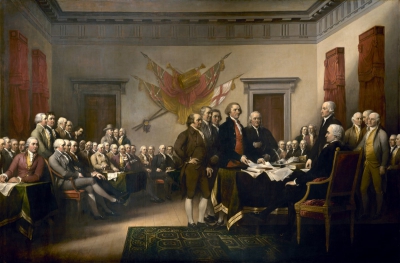The Quartering Acts were two or more Acts of British Parliament requiring local governments of Britain's North American colonies to provide the British soldiers with housing and food. Each of the Quartering Acts was an amendment to the Mutiny Act and required annual renewal by Parliament. They were originally intended as a response to issues that arose during the French and Indian War and soon became a source of tensions between the inhabitants of the Thirteen Colonies and the government in London. These tensions would later lead toward the American Revolution.
The Intolerable Acts (passed/Royal assent March 31–June 22, 1774) were punitive laws passed by the British Parliament in 1774 after the Boston Tea Party. The laws were meant to punish the Massachusetts colonists for their defiance in the Tea Party protest in reaction to changes in taxation by the British Government. In Great Britain, these laws were referred to as the Coercive Acts.
The acts took away self-governance and rights that Massachusetts had enjoyed since its founding, triggering outrage and indignation in the Thirteen Colonies. They were key developments in the outbreak of the American Revolutionary War in April 1775.
Four of the acts were issued in direct response to the Boston Tea Party of December 16, 1773. The British Parliament hoped these punitive measures would, by making an example of Massachusetts, reverse the trend of colonial resistance to parliamentary authority that had begun with the 1764 Sugar Act. A fifth act, the Quebec Act, enlarged the boundaries of what was then the Province of Quebec notably Southwest into the Ohio Country and other future mid-western states, and instituted reforms generally favorable to the French Catholic inhabitants of the region. Although unrelated to the other four Acts, it was passed in the same legislative session and seen by the colonists as one of the Intolerable Acts. The Patriots viewed the acts as an arbitrary violation of the rights of Massachusetts, and in September 1774 they organized the First Continental Congress to coordinate a protest. As tensions escalated, the American Revolutionary War broke out in April 1775, leading in July 1776 to the declaration of an independent United States of America.

1774Jun, 2
Intolerable Acts: The Quartering Act is enacted, allowing a governor in colonial America to house British soldiers in uninhabited houses, outhouses, barns, or other buildings if suitable quarters are not provided.
Choose Another Date
Events on 1774
- 31Mar
Boston Port Act
American Revolutionary War: The Kingdom of Great Britain orders the port of Boston, Massachusetts closed pursuant to the Boston Port Act. - 2Jun
Quartering Act
Intolerable Acts: The Quartering Act is enacted, allowing a governor in colonial America to house British soldiers in uninhabited houses, outhouses, barns, or other buildings if suitable quarters are not provided. - 21Jul
Treaty of Küçük Kaynarca
Russo-Turkish War (1768-74): Russia and the Ottoman Empire sign the Treaty of Küçük Kaynarca ending the war. - 1Aug
Oxygen
British scientist Joseph Priestley discovers oxygen gas, corroborating the prior discovery of this element by German-Swedish chemist Carl Wilhelm Scheele. - 1Sep
Powder Alarm
Massachusetts Bay colonists rise up in the bloodless Powder Alarm.

 English
English  español
español  français
français  português
português  русский
русский  العربية
العربية  简体中文
简体中文 